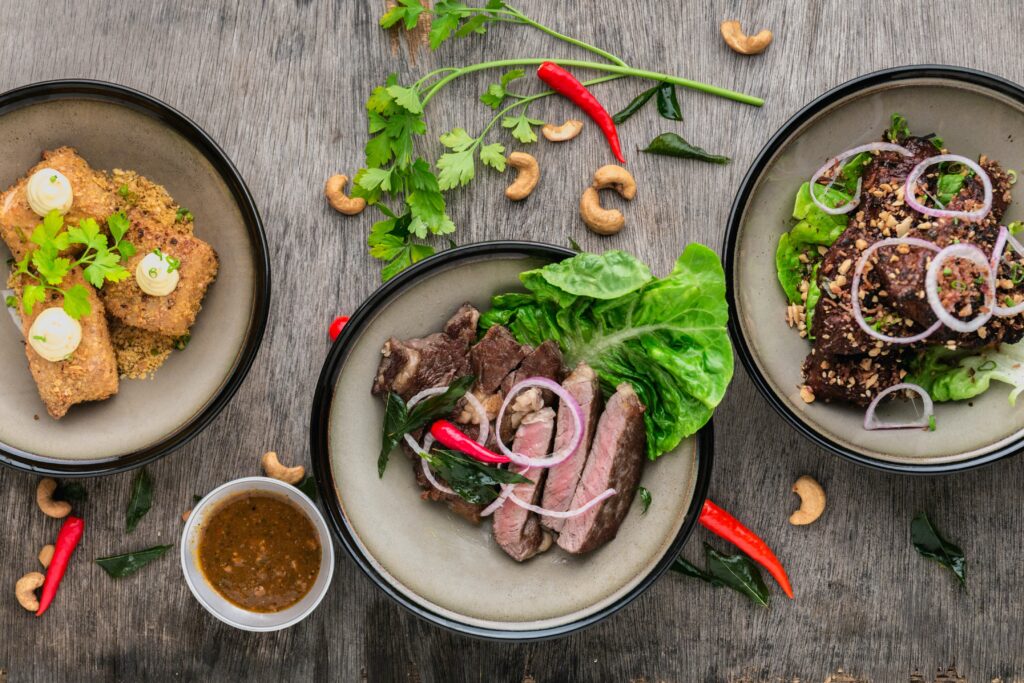Nutritionists emphasize the importance of stocking your pantry with wholesome staples, and this article highlights some of the key ingredients they recommend. Olive oil, a foundational food in the Mediterranean Diet, boasts numerous health benefits. Canned cannellini beans, on the other hand, are praised for their high protein, fiber, and nutrient content. Oats are celebrated as a versatile and budget-friendly whole grain, while lentils are hailed for their ability to provide quick-cooking plant-based protein, fiber, and essential vitamins. Canned tuna, chickpeas, and peanut butter are also featured for their versatility and nutrient-packed qualities. Additionally, diced canned tomatoes are noted for their vitamin C and antioxidant content, and pasta is acknowledged as a convenient and affordable meal base. Lastly, the article touches on the association between regular tea consumption and a reduced risk of heart disease and strokes.

Read more about the health news
Olive oil
Olive oil is a foundational food in the Mediterranean Diet, a dietary pattern that has been associated with numerous health benefits. This traditional oil is a staple in many households due to its versatility and flavorful characteristics. Made from the fruit of olive trees, olive oil is rich in monounsaturated fats, specifically oleic acid, which has been linked to a reduced risk of heart disease.
In addition to its heart-healthy fats, olive oil also contains various antioxidants and anti-inflammatory compounds. These antioxidants, such as Vitamin E and phenolic compounds, help protect against oxidative damage and inflammation in the body. Olive oil has also been shown to have favorable effects on blood pressure, cholesterol levels, and blood sugar control.
When choosing olive oil, it is important to opt for extra virgin olive oil whenever possible. Extra virgin olive oil is made from the first press of the olives and undergoes minimal processing, retaining more of its beneficial compounds compared to other types of olive oil. It is worth noting that olive oil is high in calories, so it should be consumed in moderation as part of a balanced diet.
Canned cannellini beans
Canned cannellini beans are a great addition to any pantry, as they are a versatile and nutritious plant-based protein source. These creamy white beans are high in fiber, which helps promote feelings of fullness and supports healthy digestion. They are also a good source of important nutrients such as iron, folate, and magnesium.
Cannellini beans can be used in a variety of recipes, from soups and stews to salads and dips. They have a mild flavor that easily absorbs the flavors of other ingredients, making them a versatile ingredient in many dishes. Including cannellini beans in your meals can help increase your intake of plant-based protein and fiber, which are important for maintaining a balanced diet.

Read more about the health news
Oats
Oats are a nutritional powerhouse that deserves a place in every pantry. Not only are they a great source of dietary fiber, but they also provide important vitamins and minerals such as iron, magnesium, and B vitamins. Oats are particularly known for their beta-glucan content, a type of soluble fiber that has been shown to have numerous health benefits.
Adding oats to your diet can help improve heart health, as beta-glucan has been found to lower LDL cholesterol levels. Oats also provide sustained energy and can help regulate blood sugar levels due to their high fiber content. They are a versatile ingredient that can be used in a variety of dishes, from oatmeal and overnight oats to baked goods like cookies and granola bars.
When purchasing oats, opt for whole oats or steel-cut oats rather than instant oats, as they retain more of their beneficial nutrients. They can be easily prepared by cooking them with water or milk, and you can customize them with various toppings and flavors to suit your taste preferences.
Lentils
Lentils are a nutritious and affordable pantry staple that offer a range of health benefits. These small legumes are a great source of plant-based protein, fiber, and vitamins, making them an excellent choice for vegetarian and vegan diets. They come in various colors, including green, brown, and red, each with its own unique flavor and texture.
One of the key nutritional benefits of lentils is their high fiber content. The soluble fiber in lentils helps lower cholesterol levels and contributes to feelings of fullness, helping to support a healthy weight. Lentils are also a good source of iron, which is important for transporting oxygen throughout the body, and folate, which is crucial for cell growth and development.
Lentils are incredibly versatile and can be used in a wide range of dishes, from soups and stews to salads and side dishes. They cook relatively quickly compared to other legumes, making them a convenient option for adding plant-based protein to your meals. By including lentils in your diet, you can boost your intake of essential nutrients and enjoy the many health benefits they provide.

Canned tuna
Canned tuna is a convenient and nutrient-packed ingredient that can be a valuable addition to your pantry. Tuna is a rich source of high-quality protein, which is essential for building and repairing tissues, as well as supporting immune function. It also provides important nutrients such as omega-3 fatty acids, which have been linked to various health benefits.
Omega-3 fatty acids found in tuna are known for their anti-inflammatory properties and their role in heart health. They have been shown to reduce the risk of heart disease by lowering blood pressure, triglyceride levels, and reducing inflammation in the body. Tuna is also a good source of vitamins and minerals, including vitamin D, selenium, and potassium.
When choosing canned tuna, opt for varieties that are packed in water rather than oil, as it provides a healthier option with fewer calories and less fat. Tuna can be used in a variety of dishes, from sandwiches and salads to pasta and casseroles. It is important to be mindful of portion sizes and consumption frequency due to its mercury content, especially for pregnant women and young children.
Canned chickpeas
Canned chickpeas, also known as garbanzo beans, are a versatile and nutritious pantry staple that offer a range of health benefits. These legumes are a great source of plant-based protein and fiber, making them an excellent addition to vegetarian and vegan diets. They are also rich in vitamins and minerals, including iron, folate, and phosphorus.
Chickpeas can be used in a variety of dishes, such as hummus, salads, soups, and stews. They add a creamy texture and nutty flavor to recipes and can be seasoned with various herbs and spices to enhance their taste. Including chickpeas in your meals can help increase your intake of dietary fiber, which supports healthy digestion and promotes feelings of fullness.
In addition to their nutritional content, chickpeas also contain antioxidants and beneficial plant compounds that have been associated with various health benefits. These compounds, such as flavonoids and polyphenols, help reduce inflammation in the body and protect against chronic diseases like heart disease and certain types of cancer.
Peanut butter
Peanut butter is a versatile pantry staple that is not only delicious but also packed with nutrition. It is a shelf-stable complete protein, meaning it contains all nine essential amino acids necessary for the body’s proper functioning. This makes peanut butter an excellent source of plant-based protein for individuals following vegetarian or vegan diets.
In addition to protein, peanut butter also provides healthy fats, including monounsaturated and polyunsaturated fats. These fats have been associated with a reduced risk of heart disease and improved cholesterol levels. Peanut butter is also a good source of important vitamins and minerals, such as vitamin E, magnesium, and potassium.
Peanut butter can be enjoyed on its own, spread on toast, added to smoothies, or used as an ingredient in various recipes like sauces, dressings, and baked goods. It is important to choose natural peanut butter without added sugars or hydrogenated oils to maximize its health benefits. However, it is also high in calories, so portion control is crucial when consuming peanut butter.
Diced canned tomatoes
Diced canned tomatoes are a pantry staple that can add flavor and nutrition to a variety of dishes. Tomatoes are a good source of vitamin C, which is an antioxidant that helps protect against cellular damage and supports a healthy immune system. They also provide other important nutrients like potassium and lycopene, a carotenoid that gives tomatoes their red color.
Canned tomatoes are a convenient option when fresh tomatoes are not in season, as they retain their flavor and nutritional value. They can be used in a variety of dishes, such as sauces, soups, stews, and casseroles. The lycopene in tomatoes has been associated with a reduced risk of certain types of cancer, especially prostate cancer.
When purchasing canned tomatoes, opt for varieties with no added salt or sugar to avoid unnecessary additives. It is also important to note that the acidic nature of tomatoes can cause the canned lining to leach chemicals, so choosing BPA-free cans is recommended.
Pasta
Pasta is a versatile and affordable pantry staple that can be a base for a variety of meals. It is a quick and easy ingredient to prepare and can be combined with various sauces, vegetables, and proteins to create a satisfying and nutritious dish. Pasta provides carbohydrates, which are the body’s main source of energy, as well as a small amount of protein and fiber.
When choosing pasta, opt for whole grain varieties whenever possible. Whole grain pasta is higher in fiber and provides more essential nutrients compared to refined pasta. It helps promote satiety and supports healthy digestion. Pasta can be enjoyed in moderation as part of a balanced diet and is a great option for individuals who lead an active lifestyle and require a quick source of energy.
It is important to practice portion control when consuming pasta, as it is calorie-dense. Pairing pasta with nutrient-rich ingredients such as vegetables, lean proteins, and healthy fats can help create a well-balanced meal.
Drinking tea
Drinking tea regularly has been associated with a lower risk of heart disease and stroke. Tea, especially green and black tea, is rich in antioxidants called catechins and flavonoids, which have been shown to have numerous health benefits. These compounds help reduce inflammation, promote blood vessel health, and improve blood flow, which can contribute to heart health.
Green tea, in particular, is known for its high content of a catechin called epigallocatechin gallate (EGCG), which has been studied extensively for its potential health benefits. It has been shown to help reduce LDL (bad) cholesterol levels, lower blood pressure, and enhance blood sugar regulation.
In addition to its potential cardiovascular benefits, tea also offers hydration without the calories and added sugars found in other beverages. It provides a refreshing and soothing experience and can be enjoyed hot or cold depending on personal preference. It is worth noting that herbal teas, such as chamomile or peppermint, do not contain the same catechins and flavonoids as green or black tea.
In conclusion, stocking your pantry with these healthy staples can help you create nutritious and flavorful meals. Olive oil, canned cannellini beans, oats, lentils, canned tuna, canned chickpeas, peanut butter, diced canned tomatoes, pasta, and drinking tea all offer unique health benefits and can be incorporated into a balanced diet. By having these items readily available, you can optimize your nutrient intake and enjoy a wide variety of delicious and nourishing meals.
